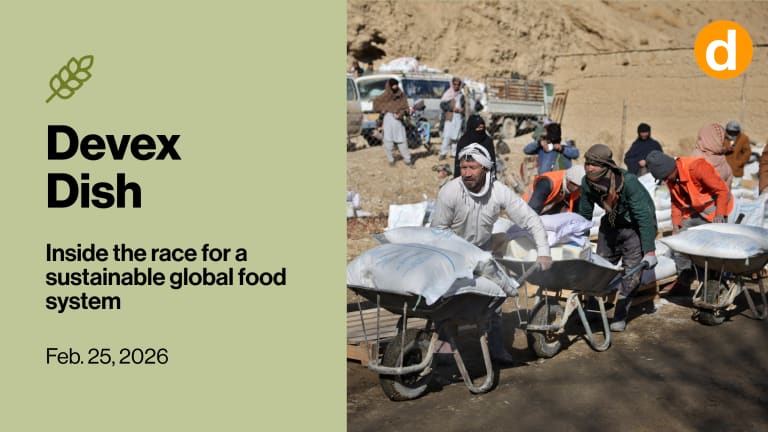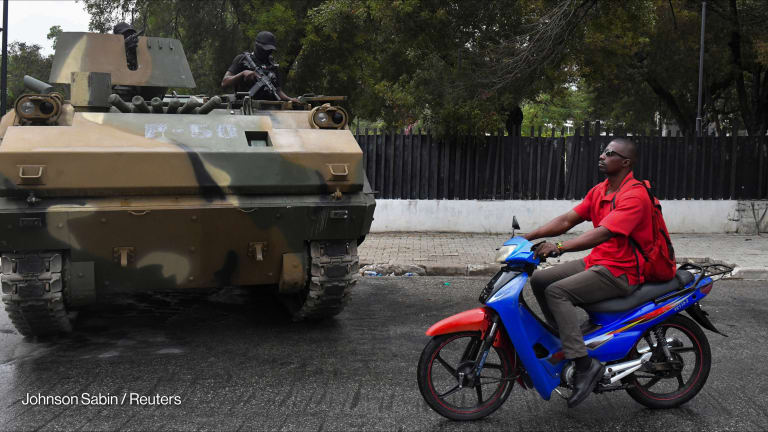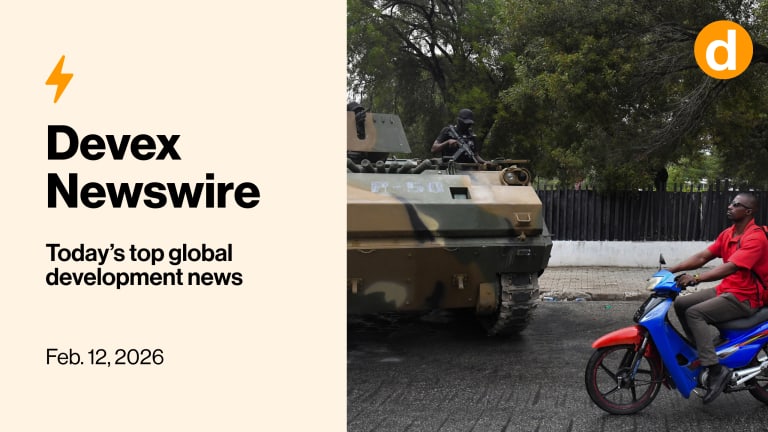Opinion: This UN Security Council resolution is a win for humanitarians

On Dec. 9, the United Nations Security Council adopted a historic resolution that exempts humanitarian aid and associated activities from the applications of targeted multilateral sanctions regimes, specifically asset freezes. The global “humanitarian carve-out,” as it’s commonly known, was the result of a joint U.S. and Irish proposal and represents a massive win for humanitarians and their advocates.
This carve-out will significantly reduce the legal, administrative, and practical impediments generated by sanctions regimes and more importantly, will enable humanitarians’ ability to respond to the needs of vulnerable people in a more timely and principled manner. What exactly does this mean and why is it important? Let’s break it down.
U.N. sanctions regimes are intended to support the political settlement of conflicts, prevent the proliferation of nuclear weapons, and counter the activities of terrorist organizations. They are aimed at terrorist groups writ large, as well as individuals associated with terrorist groups and their financial entities. In rare cases, sanctions may target state governments.
Humanitarians, in accordance with the principles of impartiality, neutrality, and independence, do not take a position on the application of sanctions. They do, however, work in areas where sanctioned groups or individuals may be present.
Practically speaking, sanctions regimes are as targeted as possible. However, compliance and de-risking measures undertaken by the public and private sectors are broad and indiscriminate. Humanitarian organizations, therefore, must figure out how to comply with sanctions regimes themselves, how to navigate the (over)compliance of partners, and how to continue to provide aid in challenging contexts made exponentially more complicated by the application of sanctions.
The adoption of UNSCR 2664 should be considered a success for humanitarians and for collective action.
—This is no small task. There is a significant body of research detailing how sanctions regimes, specifically their uneven application or ambiguous coverage, have impeded the delivery of principled humanitarian assistance. What does this look like for humanitarians — defined as U.N. agencies, international humanitarian organizations, NGOs, and their local implementing partners — practically?
The impact of sanctions can range from the suspension of lifesaving activities to the criminalization of aid and additional legal consequences, interruptions in supply chains and procurement, barriers to financial access, physical risk to staff, and so much more.
Bank de-risking measures in particular may include bank account closures or freezes, as well as the inability to make payments and transfers, or withdraw funds. Practically, this means humanitarians cannot pay staff salaries, many of whom are working on the front lines of a crisis, or pay vendors to procure food, medicines, and other critical supplies. This can halt humanitarian activities altogether, and prevent vulnerable populations from receiving lifesaving assistance.
Overall, sanctions create legal, administrative, and practical impediments that humanitarians must spend time, capacity, and money to navigate if they want to continue serving vulnerable populations.
To date, measures have been taken to combat the chilling effects of sanctions regimes and facilitate the continued delivery of humanitarian assistance in the contexts where they exist. The U.S. Treasury Department’s Office of Foreign Assets Control has provided general licenses that allow for humanitarian organizations to continue operating in areas where U.S. sanctions are in effect, like Taliban-controlled Afghanistan. Specifically, these licenses allow for transactions that are “ordinarily incident and necessary to the provision of humanitarian assistance” or other activities that support basic human needs.
There have also been humanitarian carve-outs added into U.N. sanctions regimes retroactively, specifically those of Somalia, Mali, Central African Republic, the Democratic Republic of Congo, and Afghanistan, as well as to UNSCR 2462, which covers the prevention and suppression of terrorism financing more broadly.
The wording of these provisions varies slightly by regime but in general confirms that humanitarian assistance and other activities that support basic human needs in these contexts are not a violation of their corresponding sanctions regimes. More specifically, they expressly permit the processing and payment of funds, other financial assets or economic resources, and the provision of goods and services necessary to ensure the timely delivery of humanitarian assistance.
The newly passed global humanitarian carve-out, UNSCR 2664, is the latest and perhaps most impactful in this series of safeguards for humanitarian action. While the individual licensing practices of states and carve-outs for specific regimes were welcome stopgaps, there remained a need for standardized language and its consistent application across multilateral sanctions regimes to mitigate unintended consequences to humanitarian assistance earlier and more effectively.
To be effective, such a carve-out needs to be broad in terms of stakeholders, activities, and regimes covered. UNSCR 2664 largely meets these requirements. Specifically, UNSCR 2664 covers a wide range of stakeholders, including the employees, grantees, subsidiaries, or implementing partners of operational humanitarian organizations. This necessary addition ensures local and national partners, who carry out the bulk of the response in the majority of crises, are covered.
An effective carve-out also covers all humanitarian activities carried out in a typical response and would not in any way limit or specify certain activities. UNSCR 2664 closely resembles the language used in the carve-out for activities in Afghanistan, covering both humanitarian assistance and other activities that support basic human needs.
An additional sticking point was that the carve-out should not only apply to future regimes, but also retroactively to existing regimes. UNSCR 1267, which was originally passed to sanction the Taliban, in its more recent iteration, UNSCR 2253, has expanded to cover al-Qaida and the Islamic State group. Neither regime previously included a humanitarian carve-out and so their inclusion is significant.
In an effort to address member state concerns around aid diversion for the sanctions regime covering al-Qaida, the Islamic State group, and the Taliban specifically, UNSCR 2664 stipulates that the carve-out will apply to these regimes for a period of two years, after which time the decision to extend will be made by the Security Council. Other than this condition, the humanitarian carve-out does not require annual renewal by vote and its duration is open-ended rather than time-bound. This is a major success of the resolution, as such a process would likely become politicized and dilute the carve-out over time.
The adoption of UNSCR 2664 should be considered a success for humanitarians and for collective action. The fact that more than 40 states co-sponsored this resolution speaks to how broad support for humanitarian assistance continues to be.
The next challenge will be implementing this exemption in practice, fostering a new culture of risk tolerance, and of course, eventually incorporating this exemption across domestic sanctions regimes, so that the benefits of this carve-out will truly be universal in nature.
Search for articles
Most Read
- 1
- 2
- 3
- 4
- 5








